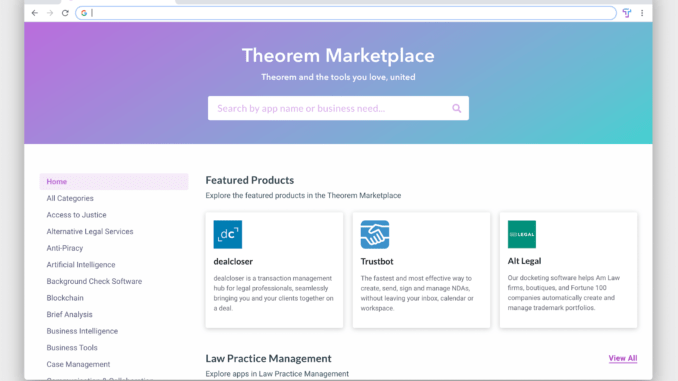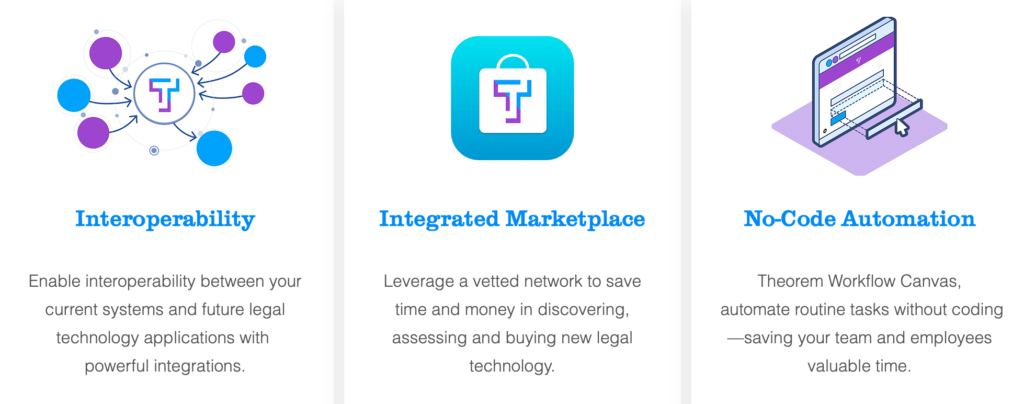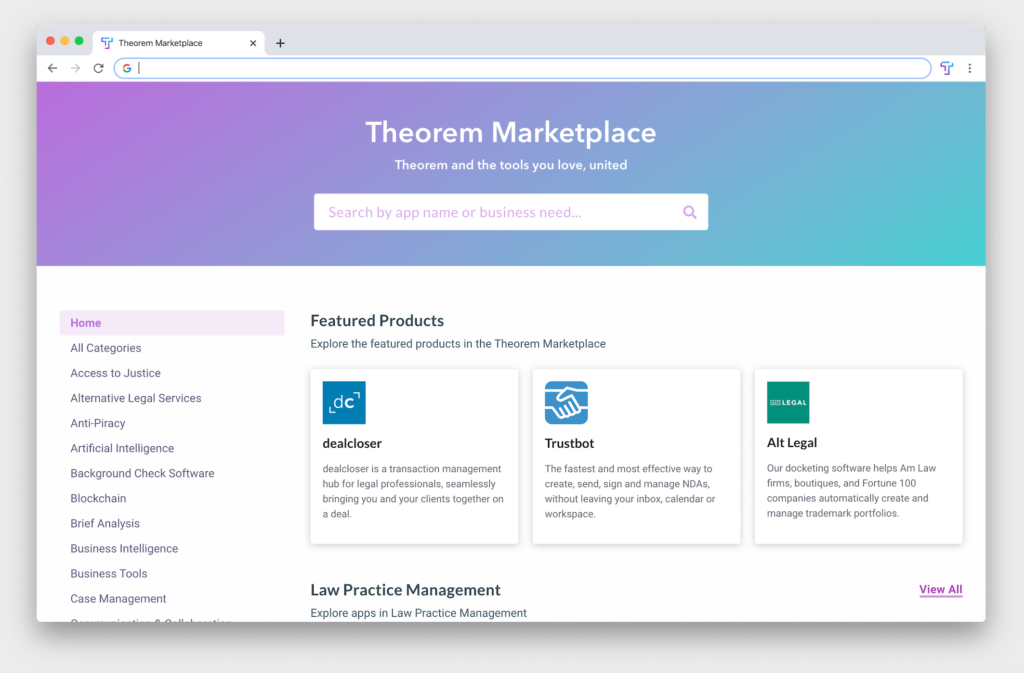
Meet Theorem, the new legal tech app store that offers tools and resources within a user’s workflow. The New York-based platform’s offering differs from that of fellow app store, Reynen Court, yet its arrival undoubtedly promises additional choice to vendors and buyers alike that are looking for a legal tech marketplace.
In fact, just a few weeks ago, Artificial Lawyer wrote an article that suggested that if Reynen Court was the only legal tech app store in the sector it could end up unintentionally gaining a controlling position as a gatekeeper for vendor engagement. This site concluded that one way to avoid this scenario would be for other app store-like platforms to arrive to provide more choice and prevent a monopoly. And fortuitously, that’s exactly what has happened.
In this case, the new choice is Theorem, created by Joshua Maley, and now with a growing number of legal tech companies already signed up, which is currently inviting law firms and inhouse teams to make use of the platform, (see interview below).

The central idea is that Theorem provides a marketplace, which can be searched by application type – and which usefully gives pricing data up front as well. It also includes a workflow system, which could help firms to deploy some of the tech that the marketplace provides.
The platform also takes into account the applications a firm may already have – but perhaps doesn’t get full use out of – and offers a wider marketplace of applications a firm may want to try as well.
The idea is to both make better use of what you already have, and to allow lawyers to more easily pick new applications they might need for specific tasks.
But, let’s allow Maley, who created the company, to explain some more:
First, what is Theorem?
Theorem is a legal tech platform that surfaces tools and resources within a user’s workflow. We accomplish this by integrating our marketplace for legal technology with best-in-class workflow and automation software.
For firms: We help firms save time and money in discovering, assessing and buying legal technology, as well as avoid the unnecessary expense associated with subscribing to numerous redundant platforms.
We also help ensure that users at firms leverage platforms to which the relevant firm subscribes, which solves a major pain point given that many subscriptions that firms have are under-utilised.
For vendors: we put their solution in the hands of users, precisely when they need it, driving not only awareness of their service, but also adoption and increased utilisation and engagement.

Can you explain the difference in approach between vendors on the platform that firms already use, and those that they don’t use yet, but may want to try?
Firms have complete control over what recommendations their professionals receive. They can choose to display only their current technology subscriptions as well as enable their professionals to access alternatives that meet acceptable standards, while controlling spend.
Our goal is to help users engage with new technologies on a per transaction basis. So, for vendors to which the relevant firm does not subscribe, there is an opportunity to enable users to leverage their solutions while paying for them on a transactional basis.
Obviously, so long as the user experience goes well and there is value from the firm’s perspective, this should lead to the transactional engagement potentially becoming a subscription relationship.
How did you come up with this idea? What did you do before?
I started my career in finance and ended up as a partner at a private office investment fund focused on early stage investments. I will forever be grateful for the experience. I learned a lot about the impact technology was going to have on the world and how to build a business from first principles.
I also had my first experience with the inefficiencies of the legal profession. After graduating from Wake Forest Law, I saw an opportunity when I realised the difficulties the profession faced in adopting modern technology, and the lack of solutions.
– Is this a competitor to Reynen Court?
We’ve been heads down and focused on our own mission, which is to deliver an ecosystem that benefits all sides of the marketplace. In this way, Theorem is redefining how the industry will adopt and engage with legal technology to enhance legal services delivery.
We understand the need to merge technology with people and process and that’s why we decided to combine our marketplace ecosystem with the ability to knit together apps in a no-code visual interface. As well, we’ve built integrations with existing core systems.
Both Theorem and Reynen Court strive to help drive technology adoption by firms and their clients, but Theorem extends beyond technology adoption to solving other problems that firms and in-house groups encounter on a daily basis.
How do you handle issues related to data security?
Data security is core to our architecture, but we are also striving to bring the entire vendor ecosystem up to the standards expected in an industry dependent on privacy and confidentiality.
You show pricing for the applications, were the vendors happy to share this info?
Vendors have incredible optionality on the platform, but we provide a number of incentives for vendors to display pricing. Our hope is that the market will drive standardisation.
In addition, our no-code recommendation engine makes it easier for vendors to offer transactional pricing models, which firms can access within workflows.
Finally, the platform has just got started, what is the road map ahead?
I’m incredibly proud of what our small team has built in a just a few short months. We’re on our way to becoming law’s complete innovation ecosystem, hosting the largest open legal technology marketplace. In response to the immense feedback, we’re excited to continue to develop our product to better serve our clients.
Our future is in the delivery and hyper-personalization of solutions for legal professionals in any given practice–anticipating a legal professional’s needs and making relevant and tailored suggestions so they can more effectively deliver for clients.
Thanks, Josh! Good to have Theorem in the market too. As they say: Ask and it will be given, seek and you will find.

—
If you’d like to know more or get early access check out the page here.
1 Trackback / Pingback
Comments are closed.